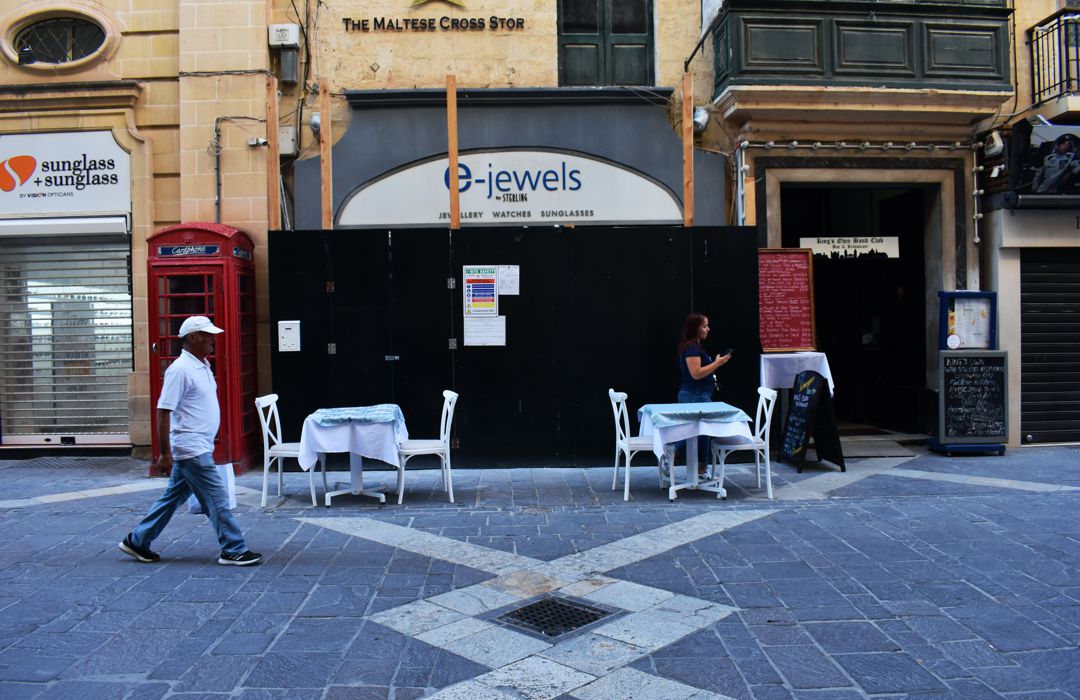
During the pandemic, we have been forced to prioritise our private domestic spaces. Will the ‘new normality’ bring the return of the old normal: the prioritisation of commercial private spaces over common spaces and interests?
by Josephine Burden
Picture by Raisa Galea
[dropcap]C[/dropcap]onfined to a private apartment, I have been dreaming about a new public space where I am free to pause and chat to neighbours or find quiet corners to sit and stare at the sea. The devil on my shoulder whispers that too many other people want too many other things from the spaces that we share outside the privilege of our private domains.
On this tiny island, as indeed elsewhere in the world, tensions around power and ownership play out in public space. And such tensions collide like atoms ending up forming what we call culture.
Walking and Defining Space: the Streets of Valletta
We devise rules on relating to each other in public space and these rules express something about who we are as individuals and as a collective. The streets of Valletta tell the stories of the powerful and the powerless.
As we work out how to move through this shared space and how to acknowledge others on our way, we shape the rules of these spaces. But of course, our power for shaping these rules largely depends on our social position, our political influence and our role in the economy.
The Knights created a grid streetscape famously referred to as “a city built by gentlemen for gentlemen”. The quote is still used nostalgically by residents who favour the exclusions implied in that phrase.
During the British era, the Maltese were welcomed onto the streets of Valletta. Kingsway/Republic St became the site of the evening promenade particularly for young Maltese in search of a mate. The Gut (Triq Dejqa/Strait St) became the domain of British servicemen with Maltese women providing the services. But it remained clear that the British government, who occupied the buildings ceded to them by the Knights, dictated the terms for use of the squares and gardens and this continued beyond Malta’s emergence as a self-governed state.
Today, the Maltese government has taken up residence in the Knights’ private residences and continues to treat public space in Malta as their domain. Government vehicles are parked on pedestrian areas and the squares. Gardens are regularly used for party-political activities.
The ‘New Normal’?
The rules of public space change as new technologies and ideas influence the world, but the rules also resist change as the privileged seek to maintain their dominance by asserting a natural order of things, ‘normality’.
Before the pandemic, the private car dominated the streets of Valletta with the exception of a few token areas dedicated to pedestrians. Just 100 years after the invention of the motorcar those able to afford it extend their private space beyond their home and claim large tracts of public space with their cars.
Before the pandemic, the private car dominated the streets of Valletta with the exception of a few token areas dedicated to pedestrians.
At first, the negotiation of this privileged use of common space was respectful of the majority of people who walked from one place to another, however, the car has come to dominate our streets and take away the common space of the pedestrians and cyclists.
The space that could otherwise serve as a playground for children and walking is perpetually occupied by parked vehicles. In Valletta, car owners expect a dedicated parking lot available at any time outside their residence, workers expect to park their cars in the bastion ditches, and visitors from throughout Malta expect to find extensive road networks that devour green public spaces. How about expecting improved public transport instead and enjoying a carfree capital?
Despite the documented reduction of pollution levels during our confinement, it will take more than a pandemic to challenge the overreliance on private cars in Malta. Too many people believe that their ‘normal’ right to more than their fair share of public space takes precedence over those who call for renegotiating the rules.
Post pandemic, I dream that cars will no longer occupy space in Valletta; I dream that public footpaths will be widened to enable people on other kinds of wheels, welcoming chairs, strollers and shopping carts to get around without having to step out into the realm of the car.
I dream that if we have to continue physically distancing, we will be able to pass each other on the walking routes in safety, even if we bump elbows and smile behind our masks at an appropriate physical distance.
The devil on my shoulder mutters again. Even if we negotiate a more just use of public space with car owners, the restaurants’ and bars’ owners will just spread out into the space with their tables and chairs and offer it to us against payment, thus privatising public space for profit.
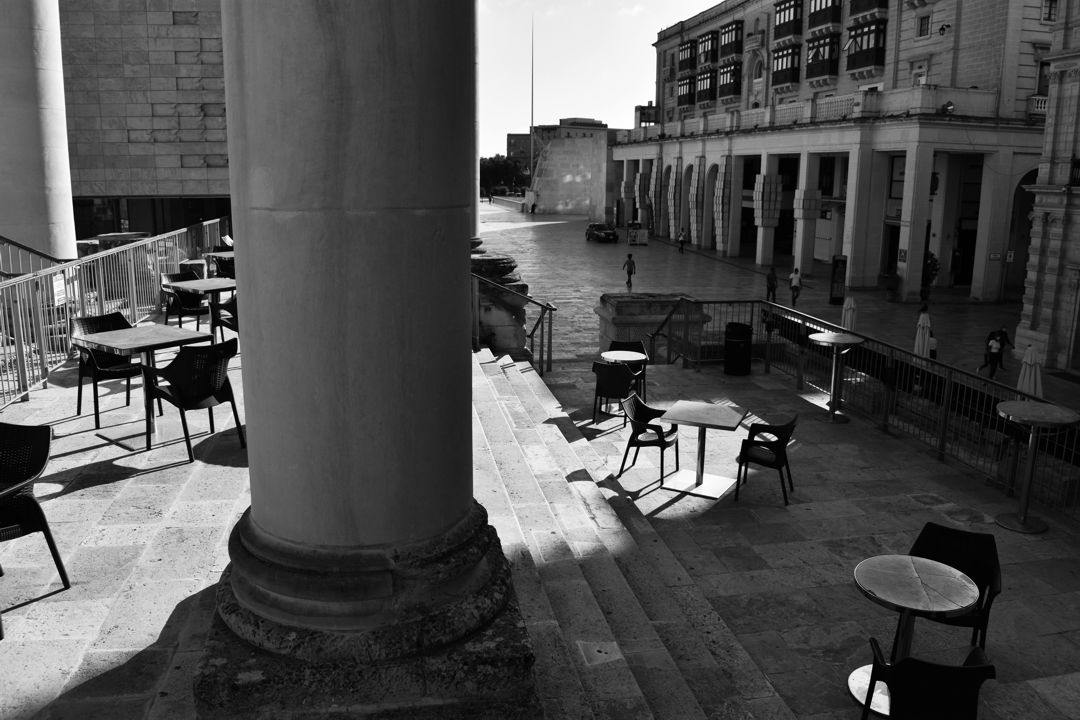
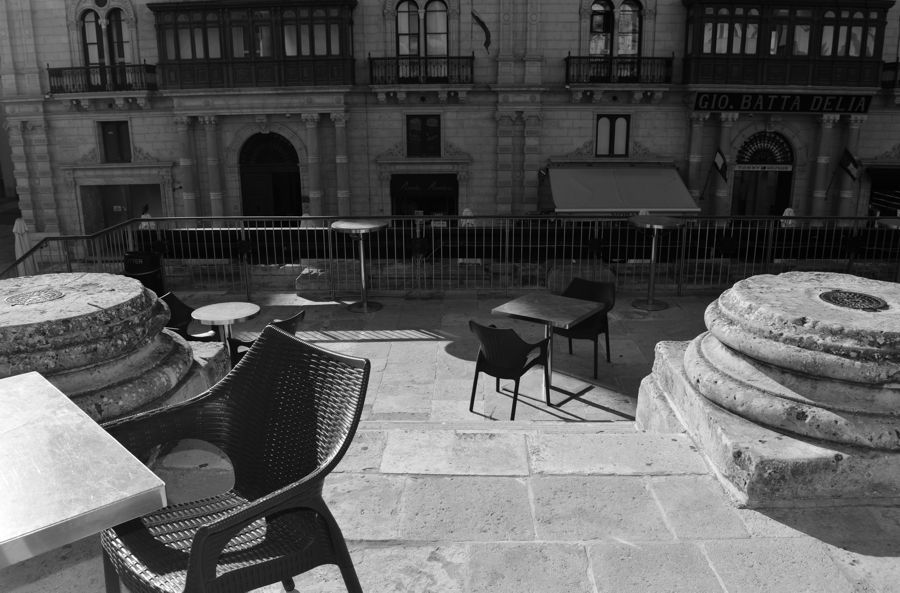
Before the pandemic, some streets in Valletta became open air eateries, barricading pathways with tables and chairs. Now, the regulations devised for the easing of lockdown are encouraging commercial enterprises to spread further into public space. In the words of Prime Minister Rober Abela, “it would be preferable for restaurants that have outdoor seating to make use of it.”
The private interests of business prove at least as important as public health measures in this process. The physical distancing of chairs and tables requires more space, meaning that outdoor dining is the first in line to claim pedestrian spaces since it is more profitable. This happens at the cost of pedestrians trying to negotiate physical distancing as they walk down the street. An interesting variation on this theme has already been noted by people appreciating the quiet area in the bustle of the city—common space steps area at Pjazza Teatru Rjal. The café that usually spreads tables across Republic Street has now taken over the terrace as well.
Which brings me to the issue of smoking and air conditioner vents. My devil whispers that many people in Malta have always used public space to dispose of the personal waste generated in their private spaces. This is considered ‘normality’. But the proposed new normal exaggerates the old inequity.
Many people in Malta have always used public space to dispose of the personal waste generated in their private spaces. This is considered ‘normality’. But the proposed new normal exaggerates the old inequity.
When smoking was recognized as a health hazard, the practice was banned in the private spaces of offices and other commercial establishments. Employees were required to smoke outdoors in public space. Before the pandemic, it was normal for me to try to exit my block of flats and to be stopped by a gathering of smoking workers from the fancy lawyers’ offices across the street. During the lockdown, we were spared the detritus of cigarette butts scattered at our entrance but last week the gathering returned with the added difficulty of physical distancing.
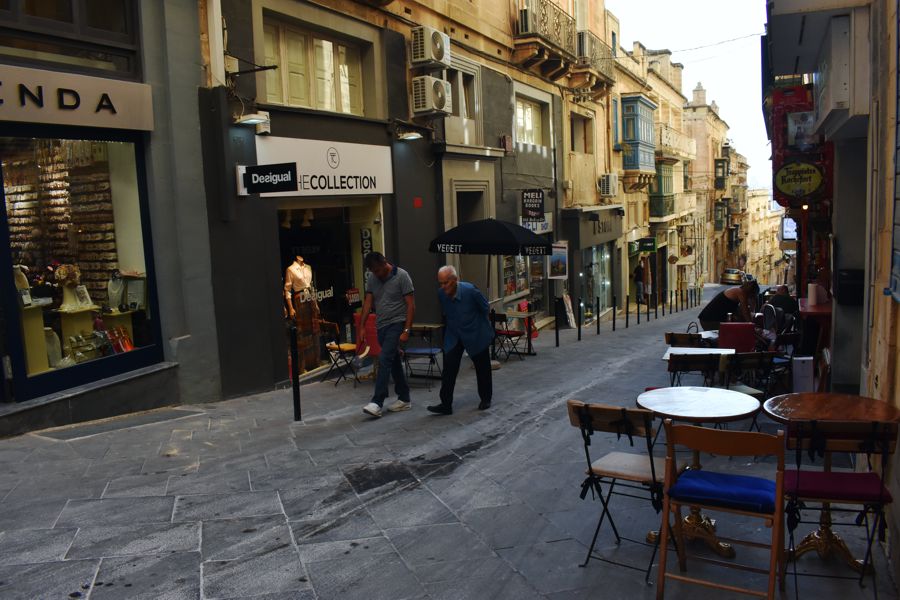
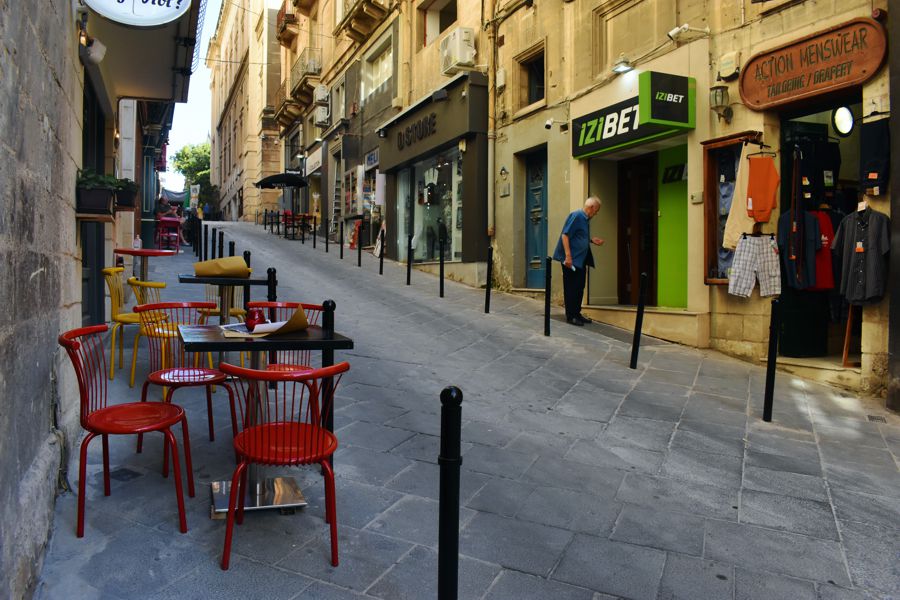
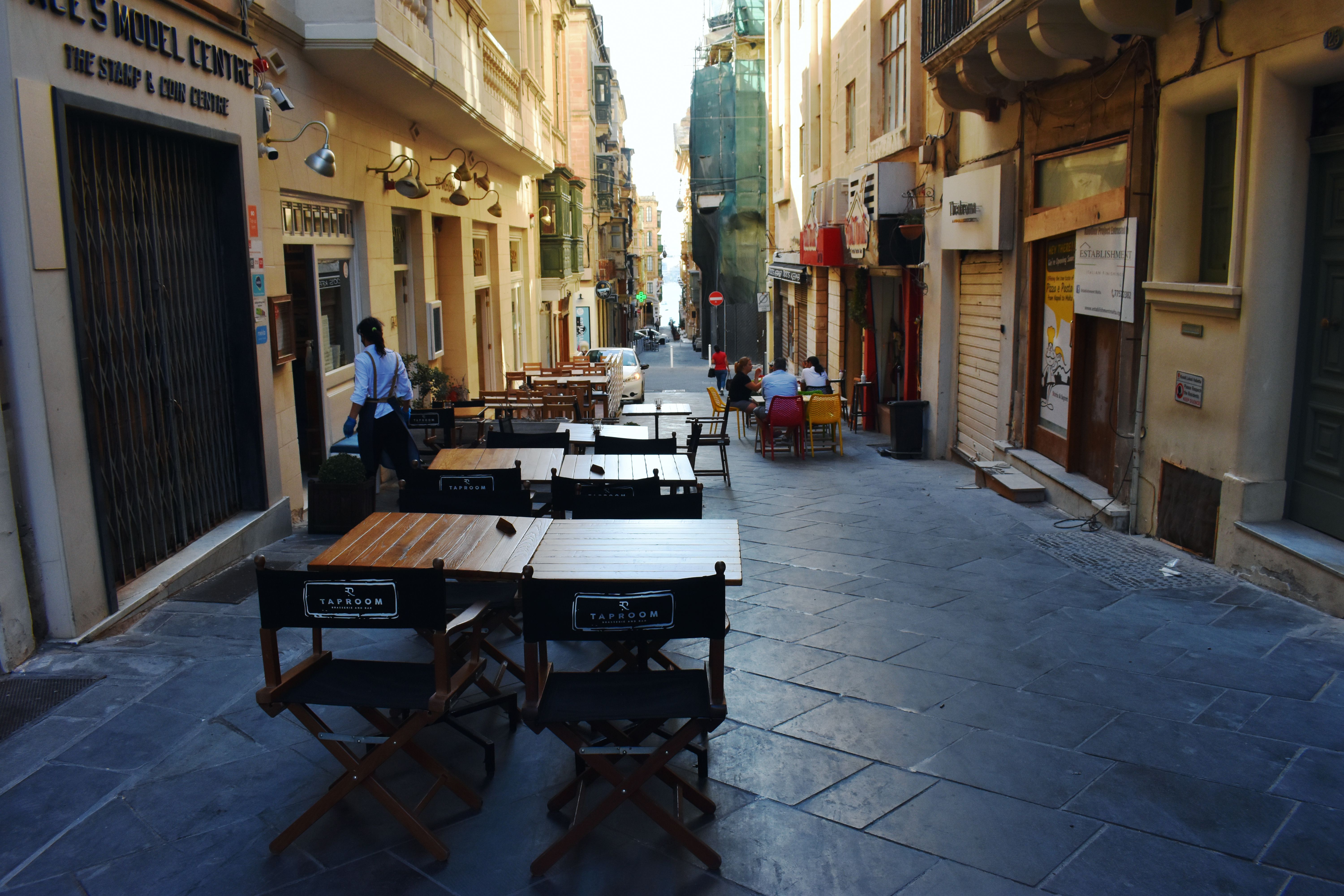
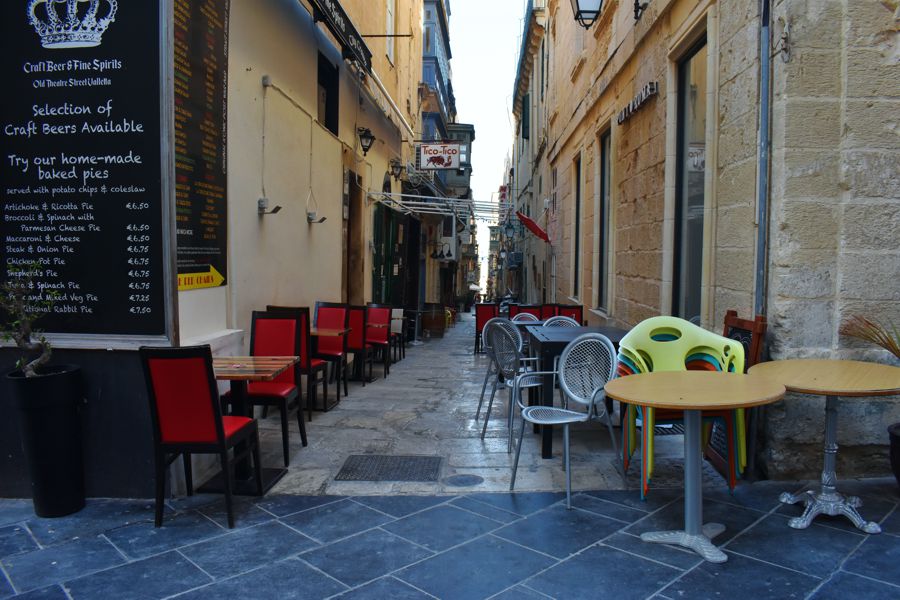
The new regulations for the reopening of restaurants and bars also require that customers move further out (10 metres) into public space for smoke breaks. This abuse of the common air that we breathe is compounded by the air conditioner vents that pour out kitchen fumes and hot air at the level of walking routes.
My devil whispers that even the old University campus on St Paul’s St does that on the corner of St Christopher St at the same time as they refuse to open up their through walk as common space between Merchants’ St and St Paul’s St.
Post-Pandemic Hopes?
Surely, there are some glimmers of hope that may help us move beyond the pandemic lockdown to a more equitable use of public space.
In the series on Valletta and Common Good, I explored the complicated relationship between public space, commercial establishments and common good. Here however I’d like to focus on two initiatives that inspire hope: MUŻA and the Design Cluster in lower Valletta.
MUŻA—the national community art museum—based their renovation on the concept of opening up their space to the community. I look forward to the reopening of the walking route through the building from La Vallette square to Merchant St and I am hopeful that their café does not spread out into that treasured space.
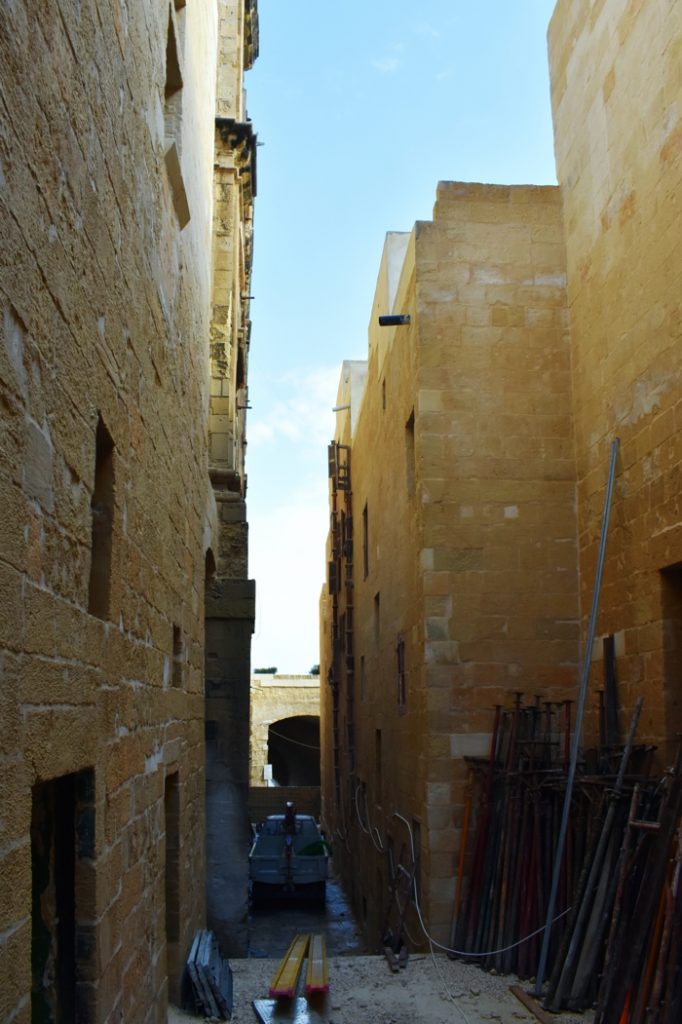
The other opening that I am looking forward to later this year is the Design Cluster (DC) in lower Valletta. From the beginning, an initiative that inspired their design has been the concept of connecting inside and outside, enabling interaction in common spaces and thereby enhancing both public and private spaces.
The DC’s roof garden will be open for public access and will enhance the Valletta skyline for the benefit of the neighbours who live in that area, even if the large installations for ventilation and an emergency generator may somewhat jar the green image of the garden’s skyline. It remains to be seen (and heard) what impact this project will have on its neighbourhood.
Cultural spaces such as the ones mentioned also have their own, maybe less tangible, but no less rigid rules of spatial use which are mostly class-based: will a working-class person ever feel comfortable strolling through a museum or making use of the opportunities a Design Cluster will offer? The initiative is likely to contribute to gentrification of Valletta, a city by and for the bourgeoisie if policies for affordable housing are not pushed alongside projects of cultural prestige.
The pause that has been forced upon us by the pandemic has nurtured the introvert in me but has also fed the outbursts of rage at injustice.
The shared roof of the large block of flats where I live has become common space. I exercise by jogging around the space, and as I water the vegetables in my new patch, I chat at a safe physical distance with my neighbours who are also rediscovering this space. We are carefully establishing rules about how we can share this space equitably. Some have previously made decisions that grabbed more of this shared space than was warranted and that is causing tension. But the more we show kindness and respect to each other, the easier it becomes.
During the pandemic, we have been forced to prioritise our private domestic spaces. Will the ‘new normality’ bring the return of the old normal: the prioritisation of commercial private spaces over common spaces and interests?
Perhaps awareness of others in shared space will improve for us all as we negotiate the new rule of physical distancing. Nevertheless, as we grope our way out of private space and back into public space, the devil on my shoulder tweaks my ear and demands continuing outrage at the inequities that the use of public space exposes.
During the pandemic, we have been forced to prioritise our private domestic spaces. Will the ‘new normality’ bring the return of the old normal: the prioritisation of commercial private spaces over common spaces and interests?
Leave a Reply